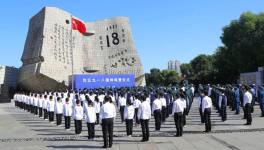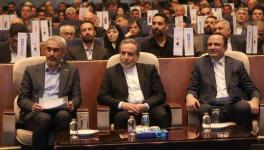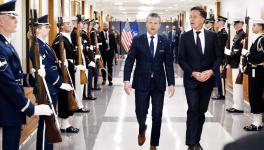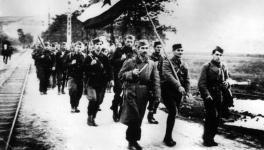Sino-Russian Alliance Comes of Age — II
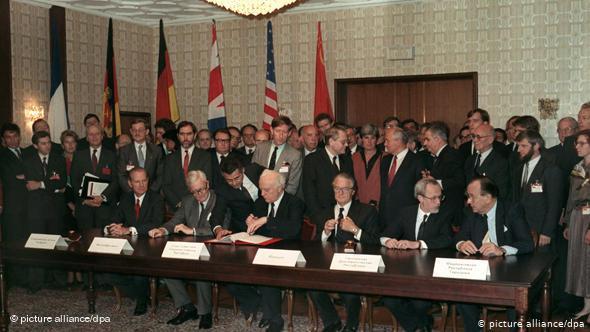
Signing ceremony of The Treaty on the Final Settlement with Respect to Germany: Foreign Ministers of USA, UK, USSR, France, GDR, FRG (from left to right) ; Moscow, September 12, 1990
“I look for the land of the Poles that is lost to the Germans, for the moment at least. Nowadays the Germans have started searching for Poland with credits, Leicas, and compasses, with radar, divining rods, delegations, and moth-eaten provincial students’ associations in costume. Some carry Chopin in their hearts, others thoughts of revenge. Condemning the first four partitions of Poland, they are busily planning a fifth; in the meantime flying to Warsaw via Air France in order to deposit, with appropriate remorse, a wreath on the spot that was once the ghetto. One of these days they will go searching for Poland with rockets. I, meanwhile, conjure up Poland on my drum. And this is what I drum: Poland’s lost, but not forever, all’s lost, but not forever, Poland’s not lost forever.” (The Tin Drum, Günter Grass)
The Russian diplomacy, which has a glorious tradition in modern history, does not make its moves accidentally or impulsively. The historical consciousness is intense. Memories from the past and the present lie deeply embedded, hopelessly entangled in the collective consciousness. A little-noticed fact remains to be that the Russian-Chinese statement of September 11 was released on the eve of the thirtieth anniversary of The Treaty on the Final Settlement with Respect to Germany.
The so-called “2+4 Treaty”, signed in Moscow on 12th September 1990 between the then Federal Republic of Germany and the German Democratic Republic — with the erstwhile World War 2 allies USSR, USA, Britain and France as co-signatories — had formalised the unification of Germany, which used to be a divided nation through the previous four decades and a half.
No doubt, the joint statement issued in Moscow on September 11 heralds a new phase in Russian foreign policy in the post-cold war era, especially with regard to Russo-German relations and Russia’s relations with Europe and the world order in general. The salience that draws attention here is that Moscow decided to embark on this new journey holding the Chinese hand. This is of great importance for European, Eurasian and international politics as a whole.
Two days after the joint statement was issued, on September 13, Russian Foreign Minister Sergey Lavrov appeared on the prestigious Moscow. Kremlin. Putin. programme of the state-run Rossiya-1 TV channel, where he was asked about the spectre of western sanctions once again haunting Russia in the shadows of the “Navalny case” and Nord Stream 2 gas pipeline project in particular, with Germany in a lead role. Lavrov summed up Russia’s deep disenchantment with its European partners in the following words:
“In principle, the geopolitical response over these years consisted of recognising that our Western partners were unreliable, including, unfortunately, members of the European Union. We had many far-reaching plans, and there are documents setting forth the path to developing relations with the EU in the energy sector and high technology, and stepping up economic cooperation in general. We share a single geopolitical space. Considering our shared geography, logistics, and infrastructure across the Eurasian continent, we benefit from a substantial comparative advantage.
“It would certainly be a grave mistake for us and the European Union, as well as other countries in this space, including the SCO, the EAEU, and the ASEAN, which is also nearby, not to use our comparative geopolitical and geo-economic advantages in an increasingly competitive world. Unfortunately, the European Union sacrificed its geo-economic and strategic interests for the sake of its momentary desire to match the United States in what they refer to as “punishing Russia.” We (Russia) have grown used to this. We now understand that we need a safety net in all our future plans related to reviving the full partnership with the European Union. This means that we need to proceed in a way that if the EU sticks to its negative, destructive positions, we would not depend on its whims and could provide for our development on our own while working with those who are ready to cooperate with us in an equal and mutually respectful manner.”
The extent of the bitterness in the Russian mind at this point in time can be put in perspective only with a recap of history devolving upon the unification of Germany in 1990, the hopes that the momentous event had raised in regard of Russo-German relations (which has a troubled history, to say the least) and what subsequently turned out during the three decades thereafter. It is a complicated story of amnesia and plain political chicanery on the part of the West.
With the benefit of the “declassified” archival materials that are available today — especially, the indispensable diary of the Soviet politician Anatoly Chernyaev, aide to Mikhail Gorbachev, relating to the year 1990 — it is possible to reconstruct Russia’s tortuous relations with the West in the post-cold war era.
Memory mixing with desire
To jog memory, the germane seeds of German unification lay in Gorbachev’s perestroika against the bigger backdrop of the globalisation phenomenon in international life that had emerged on the horizon in the 1980s. Gorbachev’s reform programme sent shock waves through Eastern Europe, which was already heaving with discontent, and a wave of political upheaval began sweeping across that region almost overnight that finally crashed on the granite walls of East Germany which had remained obstinately impervious to change. (At one point, East Germany’s communist government began blocking Soviet state-run media materials of the perestroika and glasnost genre from being disseminated in their country and mislead the public opinion.)
Nonetheless, on the frozen ground of a seemingly permanent state of divided Germany, a ray of hope appeared for the first time that a unification of Germany was not necessarily a chimera so long as Gorbachev remained in power in Moscow and his reform programme was continuing. Without doubt, the West lionised Gorbachev with a fair understanding of his susceptibility to flattery. (The vignettes of numerous such incidents lie scatted in Chernyaev’s diary.)
We tend to forget that when West Germany’s close NATO allies — Britain and France — began sensing the new stirrings of the “German Question”, they cautioned Gorbachev that he was going too fast for their liking. They pointed out that Europe was simply not ready yet for a unified German nation. The then British Prime Minister Margaret Thatcher flew down to Moscow for a tête-à-tête with Gorbachev. So did the then French President Francois Mitterand. Thatcher, by the way, was the first western leader to spot Gorbachev as a rising star in Soviet politics in the early 1980s with whom the West could “do business”. But, ironically, when it came to the German Question, Gorbachev disregarded the Anglo-French reservations. The point is, the Soviet Union — as indeed the present day successor state of Russian Federation — had already exorcised from its psyche any revenge mentality or atavistic fears about Germany over the horrific crimes it had perpetrated on the Russian people. (An estimated 25 million Soviet citizens perished in World War 2 following the Nazi invasion.)
On the contrary, Britain and France still believed that a strong Germany was neither in their interests nor in the interests of Europe as a whole. They feared that it was a matter of time before a unified Germany would reassume its role as the top dog in Europe and dominate the continent’s politics, as had happened twice already in the 20th century. The US took an ambivalent position, navigating its self-interests largely from the perspective of its transatlantic leadership, making a tough condition that a unified Germany should still remain within NATO. Basically, Lord Ismay’s famous dictum about NATO was still at play in the American calculus — that the western alliance system was meant “to keep the Soviet Union out, the Americans in, and the Germans down.”
Beggars cannot be choosers, and West Germany as the supplicant was willing to settle initially with a Hong Kong-style “one country, two systems” formula, if only Gorbachev would concede the idea of a confederation between West and East Germany. To cut short a long story of “multipolar” diplomatic wrangling, Gorbachev overruled the hardliners within his own Politburo — who of course went on to plot a coup against him within the year that eventually brought the roof crashing down on the Soviet Union — and ignoring the protestations of East Germany, went ahead to strike a deal with German Chancellor Helmut Kohl (and US secretary of state James Baker) to wave the green flag for the unification of the two Germanies.
Kohl was so thrilled after the fateful meeting with Gorbachev that according to some accounts, he spent the remaining night walking the streets of Moscow — he couldn’t sleep due to the unexpected gift from God. Kohl was a pragmatist who accepted the tough conditions imposed by Germany’s western allies for its unification. Thus, in lieu of the Allies relinquishing their post-World War 2 rights over Germany and withdrawing their militaries, Germany would accept the Oder-Neisse Line as its border with Poland and renounce all territorial claims beyond East German territory (effectively renouncing claims over most of Germany’s eastern provinces to Poland and the former Soviet Union).
A unified Germany would cap the strength of its armed forces to 370,000 personnel, renounce for all time to come the manufacture, possession of, and control over nuclear, biological, and chemical weapons and accept continued full application of the NPT forever. It will deploy military forces abroad only in accordance with the UN Charter; give up any form of future territorial claims (with a separate treaty reaffirming the present common border with Poland, binding under international law, effectively relinquishing the old German territories such as the Russian enclave of Kaliningrad in the Baltic coast) and so on.
Clearly, nothing was forgotten or forgiven as regards the potential return of German revanchism. But much has changed in the three decades since then. Many fault lines have appeared. For a start, Germany successfully integrated the backward East German part, rebuilt itself with the characteristic German discipline and rigour, and has bounced back as the powerhouse of Europe (which now gets further accentuated with the Brexit and UK’s exit from the European Union.) Two, Poland too began surging as a regional power and it has old scores to settle with Germany and Russia. (Poland recently claimed war reparations from Germany and is competing with German leadership of the EU by forming the Vysegrad Group, aspiring to bring former Warsaw Pact countries and the Baltic states under its umbrella.) To add to it, a right-wing nationalist government is in power in Warsaw that militates against the so-called liberal values that Germany espouses, and has eagerly sought the establishment of American military bases units soil.
Meanwhile, German mentality has also changed with regard to Russia, with the departure of an entire regeneration of politicians at the leadership who were dedicated to “Ostpolitik”, first propounded by Willy Brandt, predicated on the belief that a strong relationship with Russia was fundamentally in German interest. The transition from German Chancellor Gerhard Schroeder to Angela Merkel marked the end of one era of Ostpolitik being the anchor sheet of German policies toward Russia and as a key template of German foreign policy as such.
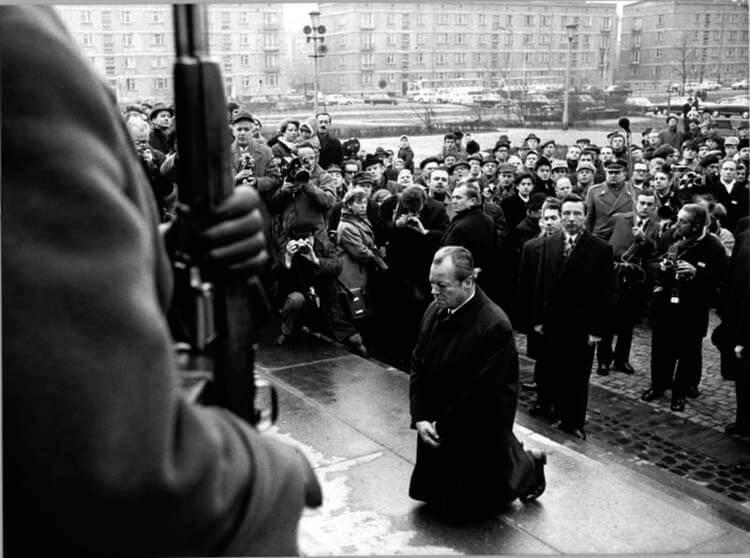
Fifty years of Ostpolitik: In one of the most iconic gestures of modern European history, Willy Brandt knelt in atonement at the memorial to the heroes of Warsaw Ghetto Uprising, December 7, 1970
Merkel’s eyes are cast on Germany’s tryst with the leadership of Europe. She began cherry picking Germany’s rapprochement with Russia, which was meant to have been a corner stone of the “2+4 Treaty” of 1990.
Beer, pretzels & Bavarian brass-band
All this has added to the tensions over the eastward expansion of NATO toward Russia’s borders and the present-day geopolitical contestation unfolding between the US, European Union and NATO on one side and Russia on the other side over the post-Soviet republics along Russia’s western borders and the Black Sea and the Caucasus. Russia has been seeking a modus vivendi between the European Union and the Eurasian Economic Union and at one point advanced the concept of a united Europe from the Atlantic to the Pacific, but Merkel is not interested.
Meanwhile, the incipient signs of German militarism have appeared. In a stunning remark in May 2017, while on campaign trial for German elections, Merkel said that Europe can no longer “completely depend” on the US and UK following the election of President Trump and Brexit. “The times in which we could completely depend on others are on the way out. I’ve experienced that… We Europeans have to take our destiny into our own hands,” Merkel told a crowd at an election rally in Munich, southern Germany.
Partly, the remarks might have been “thanks to the beer, pretzels and Bavarian brass-band enlivening the crowd,” as a BBC commentator wryly noted on that balmy day in Munich, but what was striking was that Merkel’s words were uncharacteristically passionate and unusually forthright. The message resonated all across Europe and Russia: ‘By all means keep friendly relations with Trump’s America and Brexit Britain — but we can’t rely on them.’
This led to some speculation that Germany under Merkel was drifting away from the US. Although, in reality, it was more a matter of the testy relationship between Merkel and President Trump and not at all about her own imminent transformation as a German Gaullist, so to speak. The speculation, in fact, has since died down as quickly as it had surfaced. The fact of the matter is Merkel’s generation of German politicians are staunchly “Atlanticist” — as she herself is — who place primacy on “shared liberal values” in the overarching German-American relationship (bypassing Trump) and see it as at the very core of the trans-Atlantic alliance. Thus, they are committed to building a stronger European pillar of NATO. This is twice removed from French President Emmanuel Macron’s conception of an independent European force.
Unsurprisingly, they see Russia as antithetical to their value system which is riveted on democratic principles, rule of law, human rights, freedom of speech and so on. They regard as a huge challenge Russia’s perceived aggressive, assertive policies and that Russia altered established international boundaries on the doorsteps of Europe not less than four times. Plainly put, they are shell-shocked by Russia’s resurgence under President Vladimir Putin.
The western analysts initially pooh-poohed when Putin in 2007, towards the end of his second term in office, appointed Anatoliy Serdyukov—the former head of the Federal Tax Service—as defense minister as part of an effort to combat corruption in the Russian military and carry out reforms. But, as the August 2008 Russia-Georgia conflict revealed large-scale Russian military operational failures, the Kremlin became more determined to boost military capabilities. Thus, a comprehensive reform programme began touching on all aspects of the Russian armed forces — from the total size of the armed forces to its officer corps and command system, a large-scale 10-year weapons modernisation plan, military budgets, the development of new weapon systems both for strategic nuclear deterrence and conventional forces and the Russian national security strategy and military doctrine itself.
The reform has gone further than any previous efforts in altering the force structure and operations of the Russian armed forces inherited from the Soviet Union. By 2015-2016, western analysts who were initially sceptical began sitting up and taking notice that Russia was in the midst of a major modernisation of its armed forces, driven by Putin’s ambition to restore Russia’s hard power and supported by the revenues that flowed into the Kremlin’s coffers between 2004 and 2014, when the price of oil was high. A Russia specialist at Brookings Steven Pifer wrote in February 2016, “The modernisation programs encompass all parts of the Russian military, including strategic nuclear, nonstrategic nuclear and conventional forces. The United States has to pay attention. Russia… retains the capacity to make significant trouble. Moreover, in recent years the Kremlin has shown a new readiness to use military force.” (Pifer was writing soon after the Russian military intervention in Ukraine and Syria.)
To be sure, in a national address in March 2018, Putin announced that Russia’s military had tested a group of new strategic weapons aimed at defeating western defence systems. Putin used videos shown on a large screen to present some of the weapons he discussed. He said the new weapons had made the missile defences of the NATO “useless.” In a December 2019 speech, Putin disclosed that Russia has become the only country in the world to deploy hypersonic weapons. “Now we have a situation that is unique in modern history when they (West) are trying to catch up to us,” he said. “Not a single country has hypersonic weapons, let alone hypersonic weapons of intercontinental range.”
Castrated nations and Trojan horses
Suffice to say, Germany’s “militarisation” needs to be put in perspective. Defence Minister Annegret Kramp-Karrenbauer said recently in a conversation with the Atlantic Council that “Russia needs to understand that we are strong and we intend to follow through.” She said Germany is committed to meeting 10 percent of NATO requirements by 2030 and a higher defence budget and building up of capability is in Germany’s own interest.
However, neither Germany nor Japan is at liberty to plunge headlong into “neo-militarism”. Neither has an independent foreign policy. A lot of domestic opposition will have to be overcome first to take to a neo-militarist path. In both countries, the national discourses are still dominated by post-war pacifism questioning the military and each of its operations. The two countries have voluntary armies; neither is capable of starting a war without American support or concurrence; both are in effect supplementary powers and not major forces on their own steam. Germany doesn’t want to get out of NATO, while Japan simply cannot think of life except under the canopy of its military alliance with the US. In the final analysis, both are militarily castrated nations lacking the capacity or the political will, having been the losers in the last world war.
Surely, Russia and China will not be impressed by a fake neo-militarism in Germany or Japan. So, where lies the problem? The answer is that what brings Russia and China closer together is the challenge posed by the alliance systems that the US is assembling on their borders to “contain” them. There is an upsurge of nationalist sentiments both in Poland and in a number of other countries of Central and Eastern Europe with an increasingly anti-Russian overtone. The US is pushing Germany to come to a consensus on Russia with Poland and the Baltic countries, which would of course require that Berlin altogether abandons even a residual pursuit of its traditional Ostpolitik in relation to Moscow, and switches instead to an adversarial mode.
Similarly, in Asia, the US is leading the Quadrilateral Alliance with Japan, India and Australia to encircle China. The US is hoping that the countries of the Asia-Pacific could be turned into an anti-China mode. With India, Washington has made headway, while the southeast Asian nations refuse to choose sides between the US and China, and South Korea sits on the fence.
The US is increasingly resorting to unilateral sanctions against both Russia and China that are not supported by international legal foundations, and is stepping up pressure through the extraterritorial application of national legislation to compel other countries to fall in line with its sanctions regimes and domestic laws, often in contravention of international law and the UN Charter. The European companies working on Russia’s $11 billion Nord Stream 2 gas pipeline project have been threatened with US sanctions.
Similarly, there is already talk of the US using sanctions as a weapon to browbeat small countries like Sri Lanka to terminate the Belt and Road projects being undertaken by Chinese companies. In the Indian Ocean region, India plays the role that Poland is playing on the western fringes of Eurasia, as the Trojan horse of the US regional strategies. The regime change last year in the Maldives is being taken to its logical conclusion — the establishment of an American base that supplements Diego Garcia and firms up a “second chain” to monitor and intimidate Chinese Navy in the Indian Ocean. The US, with India’s backing, is pressing the newly-elected Sri Lankan leadership to quickly ratify the military pacts that have been negotiated, especially a Status of Forces Agreement that paves the way for the stationing of American military personnel on the island, which strategists have described as an aircraft carrier.
Again, the US is unabashedly politicising the international human rights agenda and using human rights issues as a pretext for interfering in the internal affairs of China and Russia. The US has imposed sanctions against Chinese functionaries and entities in connection with their involvement in Xinjiang and Hong Kong. There is already talk of likely western sanctions against Russia over the alleged poisoning of the Russian opposition activist Alexei Navalny. Russia already faces an avalanche of US sanctions on various issues.
(Part 1 of this three-part essay can be seen here.)
Get the latest reports & analysis with people's perspective on Protests, movements & deep analytical videos, discussions of the current affairs in your Telegram app. Subscribe to NewsClick's Telegram channel & get Real-Time updates on stories, as they get published on our website.











